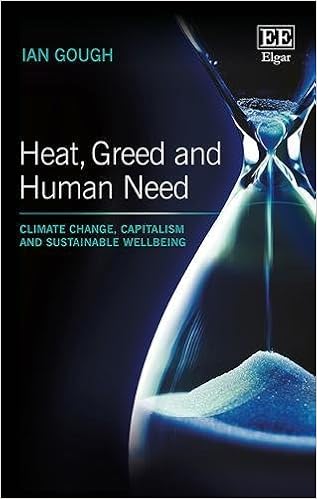Professor Ian Gough[Home] [New Book] [Publications On Climate Change] [All Other Research] [Media] | |||
 Visiting Professor, London School of Economics: Centre for the Analysis of Social Exclusion (CASE) Associate, Grantham Research Institute on Climate Change and the Environment, LSE Emeritus Professor of Social Policy, University of Bath Office: 32L 3.28 B, STICERD Tel: +44 (0)20 7955 7429 Fax: +44 (0)20 7955 6951 Email: i.gough@lse.ac.uk |
Heat, Greed and Human NeedClimate Change, Capitalism and Sustainable WellbeingPublished by Edward Elgar Ltd in October 2017  Summary:This book builds an essential bridge between climate change and social policy. Combining ethics and human need theory with political economy and climate science, it offers a long-term, interdisciplinary analysis of the prospects for sustainable development and social justice. Beyond ‘green growth’ (which assumes an unprecedented rise in the emissions efficiency of production) it envisages two further policy stages vital for rich countries: a progressive ‘recomposition’ of consumption, and a post-growth ceiling on demand.Published by Edward Elgar Publishing Ltd in hardback, paperback and electronic format Electronic version (chapter one free to access) Book reviews:'In this wonderful book, Ian Gough shows how we can deal with climate change sensibly, by developing eco-social policy that promotes human wellbeing. The result is a tour de force.' 'Between a 'dangerous present' and a 'seemingly impossible future' lie many possible unequal paths for human well-being. In this book Ian Gough suggests universal human needs provide the best framework to reconcile these dilemmas and proposes a key role for national welfare policy' 'Ian Gough has bitten off more than most of us could imagine chewing in Heat, Greed and Human Need. But his biting analysis has produced a digestible summary of the way through the challenges in tackling climate change and inequality' 'This book offers important and deep insight into the relationship between climate change and the global capitalist economy, and explores how the former demands a qualitatively new agenda in order for social policy to be able to meet needs into the future' 'An impressive piece of work, rich and dense (in a good, difficult way), touching on an extraordinary range of issues and scholarship, and packed with detail and data.' 'A well-researched, well-argued, well written, timely, and important book. not just an academic book by an academic but a manual for policy-makers.' 'Gough has brought together in one book a solid knowledge base concerning climate change and prosperity, an ambitious theoretical conceptualization and a political vision for societal reform.' 'If they want to take a break from Brexit, the brave politician (or brave civil servant) would take this book to the beach, and think about how to fix the world's biggest problem.' 'Comment concilier l'impératif de justice sociale avec la nécessité de préserver les équilibres écologiques? Telle est la question centrale du livre de Ian Gough. la plupart des analyses de ce phénomène mettent principalement l'accent sur ses dimensions technique ou économique - l'éco-efficacité des productions - sans guère prendre en compte sa dimension sociale. Le récent livre de Ian Gough vient combler cette lacune.' Early critical acclaim:‘There are few scholarly books about climate change that take the issue of the distribution of its costs, and of the costs and benefits of its mitigation, as seriously as their absolute value. This is probably the best of those books that I have come across. Rigorously rooted in Gough’s earlier work on theories of human need, the book is relentless in its pursuit of equity in respect of climate change and responses to it. Not everyone will agree with all its conclusions – for example that “green capitalism merits the term ‘contradiction’” – but they are unfailingly thought-provoking, as all good scholarship should be. Highly recommended.’ – Paul Ekins, UCL Institute for Sustainable Resources, UK‘Gough applies his trademark scholarship on universal human needs to the urgent question of social policy for the transition to a de-carbonised world. Based on a clear-eyed analysis of a wide swathe of the social science literature, and an eco-social political economy perspective, his approach is both pragmatic and deeply rooted in ethics and social justice. Highly recommended and suitable for teaching at all levels.’ – Juliet B. Schor, Boston College, US ‘Ian Gough has done something no one else has yet achieved. He has brought together theoretical and empirical analysis in four different fields – economy, ecology, social policy and politics – to produce a coherent and convincing analysis of why climate change is occurring, its human and social consequences, and how it can be addressed. Gough attaches the rigour of social science to a deeply humanitarian ethical framework; he provides at once a profound understanding of how serious climate change is and a clear-eyed realism about the kind of political and economic programme which might be able to stop it. This is a very important book.’ – Michael Jacobs, University College London, UK ‘Ian Gough has hit the sweet spot. He has shown us how it is possible to reduce inequality, satisfy human needs in culturally diverse ways and reduce the risks of dangerous climate change. What’s more, his commanding and wide-ranging critical engagement with the theory and practice of managing the transition to a safer climate demonstrates that, far from being a diversion from this project, prioritising human needs and reinventing the welfare state are critical to its political success.’ – Robyn Eckersley, University of Melbourne, Australia ‘A profoundly original intervention in the ongoing debate about climate change. A particularly interesting feature of the book is the way in which the author brings his expertise on welfare to bear on climate policy. Sustainable wellbeing is his guiding principle.’ – Anthony Giddens, Member of the House of Lords and former Director of the LSE, UK
|
||
|
| |||